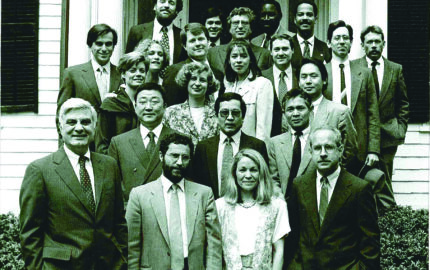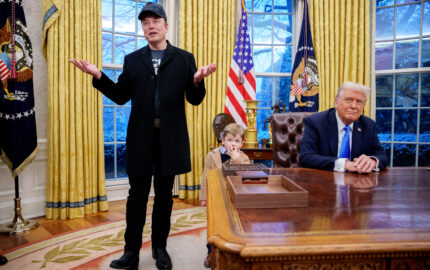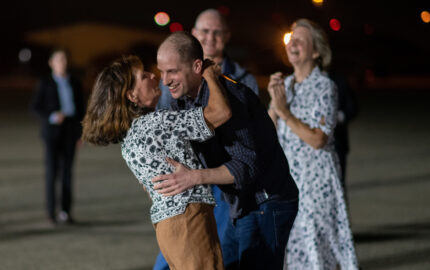This Curator’s Corner is excerpted from remarks made at the dedication of the Knight Center at Walter Lippmann House, May 24, 2004.
The Knight Center is the physical expression of an idea that was more eloquent and visionary than anyone at Harvard could have imagined in the late 1930’s. “Promote and elevate the standards of journalism and educate persons deemed specially qualified for journalism.” That was the mandate that accompanied an unexpected gift of one million dollars from the estate of Agnes Wahl Nieman.
In deciding that the income from the Nieman gift would be used to fund a sabbatical for experienced journalists, Harvard President James Conant created a fellowship program that was a success from the start and gave virtue to the concept of continuing education for working journalists. For many years, the Nieman idea has been limited to a small group of carefully selected journalists who came to Harvard for a year of study—10 at first, then 12, and now, with the inclusion of international journalists, an annual class of 24.
The larger number of fellows and affiliates, and the addition of new initiatives, such as the Nieman Program on Narrative Journalism and the operations of the Nieman Web site, began to push the limits of Lippmann House and created an imperative for improving the educational environment for the fellows. And the opportunity to add more space inspired us to think expansively about the role of the Nieman Foundation and address a fundamental question: Should the Nieman Foundation be just for the 24 fortunate journalists who are awarded fellowships, or should Mrs. Nieman’s mandate be expanded to serve the larger world of journalism through seminars and workshops where journalists can engage with leading practitioners, with Nieman Fellows, and with members of the Harvard faculty who are scholars on many subjects in the news?
The answer, of course, was to explore an expansion. As we set out to find a partner in this venture, we turned to the John S. and James L. Knight Foundation, with whom the Nieman Foundation shares a common purpose in our dedication to provide training and education for journalists. The Knight Foundation responded with the lead gift for the construction of the new wing on Lippmann House that is being dedicated this afternoon as the Knight Center.
The Nieman Foundation’s association with the Knight Foundation has been particularly meaningful to me, not only because Hodding Carter, president and CEO of the Knight Foundation, and I were Nieman classmates, but also because the first 17 years of my newspaper life were spent in the newsroom of the Akron Beacon Journal where Jack Knight was the editor. JSK was a plainspoken Ohioan who had become a national figure as chairman of Knight Newspapers. He found his voice in The Editor’s Notebook, a Sunday column he had started in 1930 at the Beacon Journal that, by the 1960’s, was reaching a national audience. The notebook was where JSK spoke his mind with blunt honesty, often to the discomfort of his social peers at the country club and business peers in the boardroom.
In 1967, public sentiment was building against the war in Vietnam. But by then, Jack Knight had been warning against U.S. involvement in Indochina since 1954. Increasingly, he saw the war as a quagmire and wrote with passionate indignation, “Either our government has no well-defined policy or stands guilty of lying to the people … or both.” That year a reporting trip to Vietnam merely deepened his skepticism. “The American people,” he wrote, “can’t understand why the lives of our young men are being sacrificed to keep unscrupulous South Vietnamese politicians in power. … We are paying a tragic price for what may prove to be an unobtainable goal.”
Back home, he denounced the rise of anti-intellectualism as a corrosive side effect of the war. “Although the right of dissent is clearly set forth in our Bill of Rights,” he wrote, “there are those who would deny this right to others who view U.S. involvement in Vietnam as a grim and unending tragedy.”
The following May, when the Pulitzer Prize for editorial writing was awarded to Jack Knight, then 74 years old, the Pulitzer Board noted his clearness of style, moral purpose, sound reasoning, and power to influence public opinion. JSK set a high standard for the stewardship of newspapers as a public trust. He was a smart and successful businessman who never allowed the imperatives of the bottom line to diminish the editorial strength or integrity of his newspapers.
In honoring Jack and Jim Knight today, we can recognize how Agnes Wahl Nieman’s eloquent vision has been nurtured over the years by wise curators and accomplished fellows who strengthened the core program and expanded the reach of the Nieman idea to the larger world of journalism. Were Mrs. Nieman with us today, I believe she would heartily approve.



